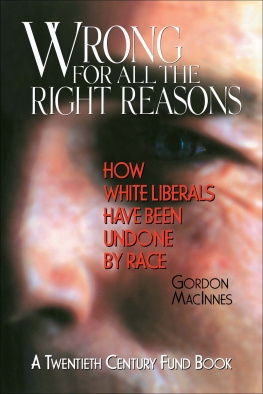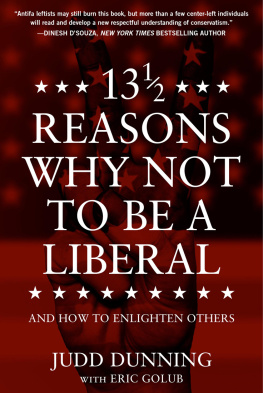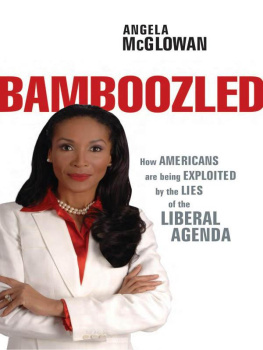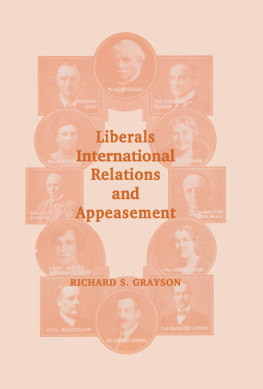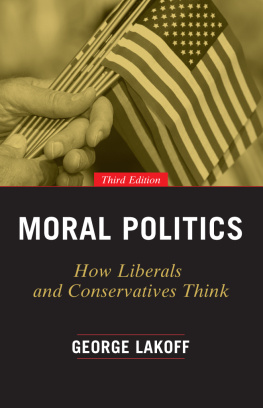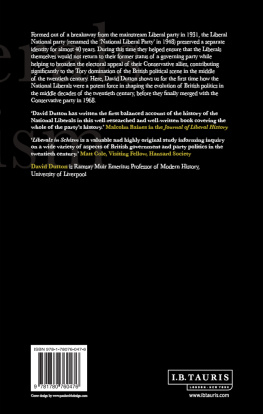Thank you for buying this ebook, published by NYU Press.
Sign up for our e-newsletters to receive information about forthcoming books, special discounts, and more!
Sign Up!
About NYU Press
A publisher of original scholarship since its founding in 1916, New York University Press Produces more than 100 new books each year, with a backlist of 3,000 titles in print. Working across the humanities and social sciences, NYU Press has award-winning lists in sociology, law, cultural and American studies, religion, American history, anthropology, politics, criminology, media and communication, literary studies, and psychology.
WRONG FOR ALL THE RIGHT REASONS
WRONG FOR ALL THE RIGHT REASONS
HOW WHITE LIBERALS HAVE BEEN UNDONE BY RACE
GORDON MACINNES
A TWENTIETH CENTURY FUND BOOK
The Twentieth Century Fund sponsors and supervises timely analyses of economic policy, foreign affairs, and domestic political issues. Not-for-profit and nonpartisan, the Fund was founded in 1919 and endowed by Edward A. Filene.
BOARD OF TRUSTEES OF THE TWENTIETH CENTURY FUND
Morris B. Abram, Emeritus
H. Brandt Ayers
Peter A. A. Berle
Alan Brinkley
Jos A. Cabranes
Joseph A. Califano, Jr.
Alexander Morgan Capron
Hodding Carter III
Edward E. David, Jr., Emeritus
Brewster C. Denny, Emeritus
Charles V. Hamilton
August Heckscher, Emeritus
Matina S. Horner
Lewis B. Kaden
James A. Leach
Richard C. Leone, ex officio
P. Michael Pitfield
Richard Ravitch
Arthur M. Schlesinger, Jr.,
Emeritus
Harvey I. Sloane, M.D.
Theodore C. Sorensen, Chairman
James Tobin, Emeritus
David B. Truman, Emeritus
Shirley Williams
William Julius Wilson
Richard C. Leone, President
Library of Congress Cataloging-in-Publication Data
MacInnes, Gordon, 1941
Wrong for all the right reasons : how white liberals have been undone by
race-- / Gordon MacInnes.
p. cm.
A Twentieth Century Fund book.
Includes index.
ISBN 0-8147-5543-7 (acid-free paper)
1. United StatesRace relations. 2. LiberalismUnited States
3. ConservatismUnited States. 4. United StatesPolitics and government
1993 I. Title.
E185.615.M22 1995
305.800973dc20 95-32529
CIP
Cover design and illustration: Claude Goodwin
Manufactured in the United States of America. Copyright 1996 by the Twentieth Century Fund, Inc. All rights reserved. No part of this publication may be reproduced, stored in a retrieval system, or transmitted, in any form or by any means, electronic, mechanical, photocopying, recording, or otherwise, without the prior permission of the Twentieth Century Fund, Inc.
DEDICATION
In memory of my Dad, who shared his name with me and much more than he ever knew.
FOREWORD
The interaction of race, poverty, and public policy has been tangled in disgraceful partisan jockeying and muddled by competing versions of reality for much of American history. Indeed, in the broadest sense, that history itself is incomprehensible without an appreciation of the deep and abiding influence of the politics of race on issues, debates, and elections. For all the talk of third parties in recent years, a look back provides us, for example, with only one real case of a permanent success: the Republican party, founded largely as a vehicle for opposition to slavery. And significantly, there can be little doubt that the more recent history of the two major parties has been greatly affected by shifts in their perceived positions on race-related issues.
When Franklin Roosevelt reached out to the nations least fortunate, his party succeeded the GOP as the traditional home of black voters. A generation later, when Northern Democrats broke their unholy and usually unspoken alliance with segregationist Southerners, they starting a process that, in effect, shrunk their own party. And today, the formerly solidly Democratic South is well on its way to becoming almost equally dependable for the Republicans. This shift is a result, in no small measure, of the willingness of some to exploit racial tensions for political purposes. From a historical perspective, in other words, neither of the ascendent parties has an unblemished claim to the high ground on this central issue of American society.
To be sure, the nation has moved beyond the racial ratios which stain our Constitution, the violence of the Civil War, the hypocrisy of Jim Crow, the sit-ins at lunch counters, and the struggle for basic voting rights; but we havent reached the day when discussions of central domestic problems such as teen-age pregnancy, drug abuse, housing, education, and so forth have no racial or ethnic component. Perhaps there will come a time when political debate and policy outcomes in the United States are not warped by the diversity of our population.
Meanwhile serious discussions of action on domestic issues must move beyond arguments about the facts to include discussions of politics. That premise is the starting point for Gordon MacInness work.
MacInnes, formerly a foundation executive and consultant, began this book as an effort to catalogue what works and what doesnt among the approaches to urban poverty. In the course of writing, he found time to be elected to the New Jersey State Senate and reason to shift the focus of his research. He became convinced that the problems of race and poverty cannot be confronted successfully until there is a considerable shift in the approach of liberals and progressives, still the most ardent political advocates of the most ambitious policy solutions.
MacInnes examines the high water mark of national ambitions in this area: Lyndon Johnsons Great Society programs, many of which received bipartisan support. Indeed, considering Republican Senatorial leader Everett Dirksens pivotal role in the enactment of the 1965 civil and voting rights laws and Richard Nixons substantial expansion of social and urban programs, the nation, for a time, was united as never beforeor sincein its determination to conquer the evils of poverty and racism. He argues, in the pages that follow, that these successes were a false dawn, quickly replaced by a new sort of divisiveness. Central to his argument is the contention that the stifling of honest debate about the effectiveness and success rate of these new programs was a critical factor in reversing the political viability of nearly all the programs initiated during the period.
MacInness bill of particulars is lengthy. His ideas for breaking the current pattern of politics on these matters is specific. His call for more open and critical debate among supporters of social programs and for approaches based on need, not race, are spelled out in considerable detail. He notes that there are glimmerings of this sort of thing in the reexamination under way among progressives in both parties, itself a reaction to the recent success of conservative forces. There may be, as well, he notes, new possibilities outside the traditional party structures. Overall, MacInnes offers many provocative points that can help to animate and focus these fresh looks at future national responses to racism and poverty.
One thing is certain: the end of the road toward social justice and reasonable economic equity is not yet in sight. The necessity to confront the peculiar American dilemma is as clear as ever. The importance of candor on these difficult subjects is undeniable. Gordon MacInnes has chosen a topic and an approach, therefore, that compels our attention. On behalf of the Trustees of the Twentieth Century Fund, I thank him for his efforts.

